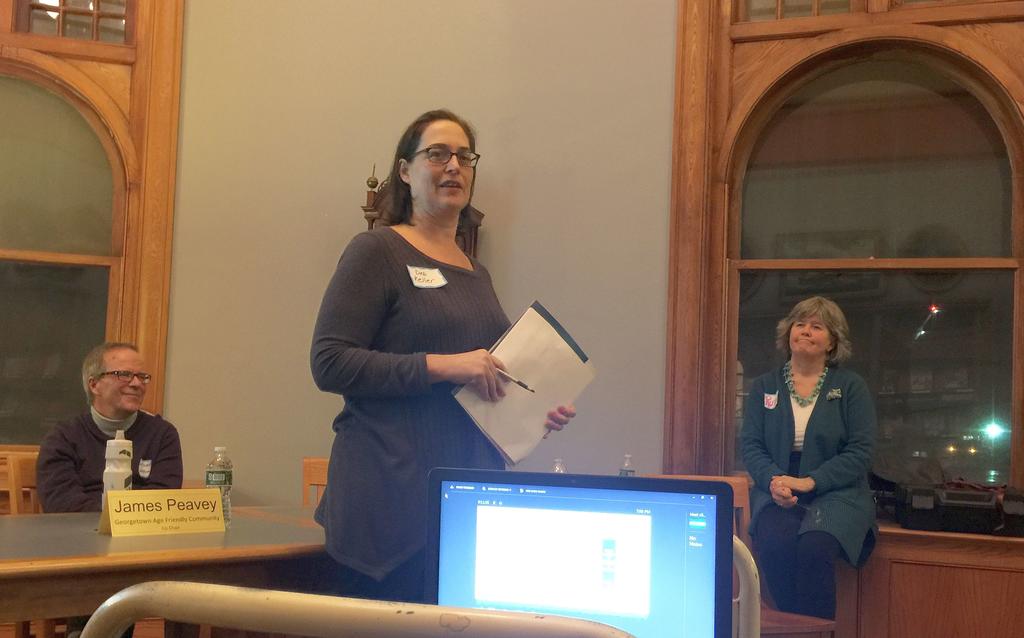BATH — After two brainstorming forums on ways to make Bath and its neighboring communities more “age friendly” to seniors, a new panel of area residents plans to pool ideas and may hold another informational gathering in May.
A Feb. 15 meeting, hosted by Ruth Lawson-Stopps at Patten Free Library, followed a gathering held Jan. 11. It featured presentations from residents from communities that already have initiatives underway to help seniors thrive and remain in their homes.
Steve and Donna Palmer represented Living Well in North Yarmouth; Dave Brown, Harpswell Aging at Home, and Jim Peavey, Age-Friendly Georgetown, joined Deb Keller of Bath Housing, who discussed that organization’s Comfortably Home program.
At the end of the meeting, Lawson-Stopps asked volunteers from Bath, Arrowsic, Georgetown, Phippsburg, West Bath and Woolwich to form a steering committee to further explore ideas and initiatives from last week’s meeting.
“Maybe it’s just sharing information, maybe get some ideas of things to do together,” she said.
Audience members then kicked the process off by suggesting ways the communities could collaborate more for their older residents. For example, sharing a list of contractors who could make safety improvements to seniors’ homes, addressing transportation challenges outside of Bath, getting more teens involved, and spreading the word about social activities.
As collaborations between towns were paramount to last week’s discussion, so have meetings of the minds within those communities that already have age-friendly initiatives. North Yarmouth’s Living Well program, which caters to the needs and wants of all ages, has partnered with the town’s Events Committee to hold an ice cream social and also worked with the Parks and Recreation Committee to organize a kite festival.
Living Well has also worked with the town’s fire chief to net an AARP grant to acquire residential Knox-Boxes – vault-like metal containers hung over the entry door that can be unlocked by emergency personnel to access a house key. The program also arranges daytime meetings on key town issues like the Wescustogo Hall rebuild, for those who cannot attend the evening gatherings, and also organizes transportation for those in need.
Log onto northyarmouth.org/living-well-north-yarmouth for more information.
Meanwhile, Harpswell’s Aging at Home initiative aims to help people thrive while doing just that. Its Food Committee kicked off the Cooking with Friends and Lunch with Friends programs in 2017, providing more than 800 meals on 20 occasions where people could cook, socialize and, of course, eat.
The organization’s Repairs and Resources Committee collaborated with the town of Harpswell and Habitat for Humanity to provide weatherization and home repairs to 24 homes last year, and a Community Development Block Grant is funding such work on another 25 homes this year.
The group’s Transportation Committee found drivers for the Volunteer Transportation Network at People Plus, which caters to older people unable to drive. Eighteen Harpswell drivers made 850 trips over more than 15,000 miles, bringing people to destinations like the doctor or grocery store.
Visit hah.community for more information.
Georgetown’s fledgling age-friendly program notes at agefriendlygeorgetown.org that more than one-third of the town’s residents are older than 65, many of whom want to be able to remain in their homes. Peavey credited Harpswell’s program as an important resource as Georgetown got its initiative off the ground.
Bath Housing’s Comfortably Home program, information about which is at bathhousing.org/aging-in-place/comfortably-home, offers free services to people who are 60 and older or have a disability, live within a radius of about 15 miles of Bath, own their home or live in a house a family member owns, and meet certain income guidelines: less than $39,500 annually for one, $45,150 for two, $50,800 for three, and $56,400 for four.
Services include safety checks of smoke and carbon monoxide detectors, dryer vents, refrigerator coils, light bulbs and furnace filters; accessibility modifications like grab bars and handrails, shower wands and seats, and raised toilet seats; and minor repairs such as winterizing, flooring repairs, storm door installation, gutter work, and steps or existing ramps.
Having served 95 people since October 2015, Bath Housing reports an 85 percent reduction in falls and 91 percent drop in severity of falls among the first 56 participants, a 54 percent decrease in visits to the hospital, an 87 percent decline in fire-related close calls. All reported feeling safer at home, and nearly all credited the program with relieving a financial burden, Keller said.
Alex Lear can be reached at 781-3661 ext. 113 or alear@theforecaster.net. Follow him on Twitter: @learics.

Deb Keller, executive director of Bath Housing, reports on the organization’s success with its “Comfortably Home” initiative. She, along with James Peavey of Georgetown, left, and Ruth Lawson-Stopps of Bath, were among those to speak during a forum on aging at Patten Free Library in Bath Feb. 15.
Comments are no longer available on this story